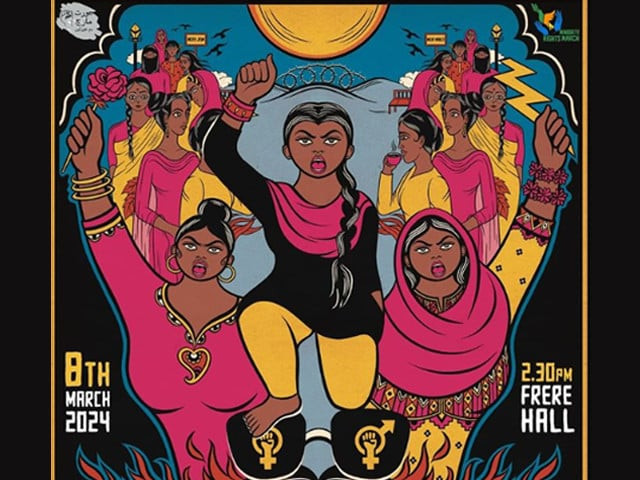In recent times, Pakistan has experienced a surge in movements challenging traditional gender norms and advocating for women's rights. At the forefront of this movement is the Aurat March, an annual event held on International Women's Day, which has sparked both controversy and conversation nationwide. While feminism has often been misunderstood and misrepresented in Pakistan, the Aurat March has emerged as a platform for redefining feminism, challenging stereotypes, and advocating for gender equality.
Feminism, in the Pakistani context, has long been associated with western ideologies and often viewed through a negative lens. Misconceptions flourish, with many perceiving feminism as a threat to traditional values and societal structures. However, at its core, feminism simply advocates for gender equality, seeking to dismantle systemic barriers that hinder women's rights and opportunities. In Pakistan, where gender disparities persist in various spheres of life, feminism takes on added significance as a means of addressing deep-rooted inequalities.
Originating in Pakistan in 2018, inspired by global movements, the Aurat March endeavours to spotlight issues such as gender-based violence, economic disparity, and reproductive rights. What distinguishes the Aurat March is its grassroots nature and inclusive approach, welcoming women from diverse backgrounds, including marginalised communities and transgender individuals. This inclusivity reflects the varied experiences and challenges encountered by women in Pakistan.
A primary goal of the Aurat March is to challenge stereotypes and misconceptions surrounding feminism. Through innovative slogans, posters and performances, participants aim to confront societal norms and initiate discourse on often overlooked issues. For example, slogans such as “My body, my choice” and “Khud khana garam karlo (Heat up your own food)” have acquired attention for their boldness and unapologetic stance on women's independence.
According to a report by the Aurat March organisers, violence against women remains a pervasive issue in Pakistan, with incidents of domestic violence, honour killings, and acid attacks frequently reported. The Human Rights Commission of Pakistan reported 2,297 cases of violence against women in 2020, including 244 honour killings and 45 acid attacks. Despite legislative reforms and increased awareness campaigns, many women continue to face discrimination and violence in their daily lives.
Gender-based discrimination, violence against women, and instances of physical and sexual abuse are widespread in Pakistan. The country lags behind on various economic and human development indices, ranking as the third-to-last country on the Gender Development Index (GDI) and the sixth most dangerous place for women globally. In this context, the Aurat March of 2019 marked a historic moment for feminists in Pakistan. It represented the first instance where women openly addressed issues surrounding sexuality, sexual and reproductive health, consent, marriage, divorce, and bodily autonomy in the public domain.
Traditionally, these topics have been silenced and reduced to the private domain, leaving women who face sexual violence and harassment burdened with fear and insecurity. However, the 2019 Aurat March shattered taboos by empowering women to discuss the everyday challenges they encounter within the confines of their homes, in markets, workplaces, and public spaces, without fear or shame.
Posters and placards displayed during the march addressed a wide range of issues, from reproductive health and menstruation, to demanding the eradication of unsolicited online content. By bringing these issues into the public sphere, the Aurat March challenged societal norms and highlighted the urgent need for conversations and action regarding women's rights and bodily autonomy.
This significant shift from private to public discourse not only raised awareness but also fostered a sense of empowerment among women across Pakistan. It signified a collective refusal to be silenced or ostracized any longer, sparking a national dialogue on gender equality and women's rights. Through their participation in the Aurat March, women reclaimed their voices and demanded recognition of their inherent dignity and autonomy.
Furthermore, economic opportunities for women remain limited. According to the World Bank, Pakistan has one of the lowest female labour force participation rates in the world, with only 22% of women aged 15 and above participating in the labour force. Additionally, women face significant wage disparities, earning on average 34% less than their male counterparts for similar work. Despite challenges, the movement continues to gain momentum, with support from activists, civil society organisations, and international allies.
Through its bold and unapologetic approach, the Aurat March is reshaping perceptions of feminism in Pakistan. Rather than being viewed as a divisive or foreign concept, feminism is increasingly seen as a movement for social justice and equality. By focusing the experiences of not just Pakistani women but also transgenders and khawajasira community and amplifying their voices, the Aurat March underscores the universality of feminist struggles while acknowledging the unique challenges faced within the Pakistani context.
As Pakistan progresses towards gender equality, the Aurat March stands as a symbol of hope and resilience, challenging stereotypes, amplifying marginalised voices, and advocating for systemic change. Despite facing opposition from conservative elements and entrenched patriarchal norms, the march exemplifies the power of collective action and solidarity in driving social change.
The Aurat March represents a defining moment in Pakistan's feminist movement, challenging stereotypes and redefining feminism in the Pakistani context. By amplifying the voices of women and marginalised communities and advocating for their rights, the march is pushing boundaries and sparking important conversations about gender equality.
In commemorating International Women's Day, let us reflect on the significance of the Aurat March and reaffirm our commitment to the ongoing struggle for gender justice in Pakistan and beyond.



COMMENTS
Comments are moderated and generally will be posted if they are on-topic and not abusive.
For more information, please see our Comments FAQ